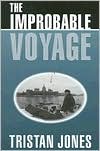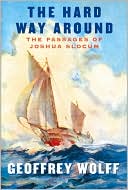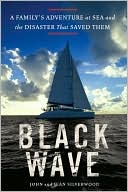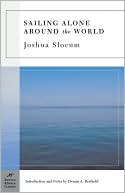The Improbable Voyage
The Improbable Voyage is the astonishing account of Tristan Jones' 2,307-mile voyage across Europe in an ocean-going trimaran. With characteristic wit and inimitable style, the legendary sailor and master storyteller continues this tale of his round-the-world voyage begun in Outward Leg.\ Having half-recovered in an Amsterdam hospital from broken ribs and a collapsed lung, Tristan, together with his crew, sets off up the Rhine and experiences the most severe winter known in Europe for many...
Search in google:
The Improbable Voyage is the astonishing account of TRistan Jones' 2,307 mile voyage across Europe in Outward Leg. Continuing his round-the-world journey, Tristan traveled from the North Sea to the Black Sea via the rivers Rhine and Danube. Tristan welcomed each difficulty as a challenge to be met and overcome. Battling ice and cold, life-threatening rapids and narrow defiles, German bureaucrats and Romanian frontier police, Tristan made his way through eight countries and emerged triumphant, if battered, bruised and penniless, at the Black Sea. Tristan gives us a vivid glimpse of the quality of life along Europe's oldest water routes and behind the Iron Curtain. Publishers Weekly In this sequel to Outward Leg we find Jones preparing to take his ocean-going trimaran from London to Amsterdam and then through the heartland of Europe, via the Rhine, Main and Danube rivers to the Black Sea. Navigation will be more difficult than on the open sea, he tells us, because of heavy commerical traffic on the Rhine, the 62 locks on the Main between Frankfurt and Nurnberg (Nuremburg), submerged rocks and shifting sand bars. At the Nurnberg docks, ship and crew reach a dead end, trapped in ice and a web of bureaucracy. There is no water route to the Danube, and Jones needs a special permit to haul Outward Leg overland. His involuntary 10-week delay garnered publicity and sympathy for his cause (aiding the handicapped); his original two-man crew (from New York) departed, to be replaced by an engaging young German, Thomas. At the end of March they set out from Ingoldstadt on ``Father Danube,'' accompanied by the blare of bagpipes from a tape deck. It is Jones's boast that his trip marked the first time that a sea-going yacht has traversed the uncharted lower DanubeAustria, Czechoslovakia, Hungary, Yugoslavia, Romania, to the port of Varna in Bulgaria and into the Black Sea. There are hostile border guards, gunboats, hazardous defiles and rapids; a few glorious days in Vienna and Budapest; relief at journey's end. Good adventure, vintage Tristan Jones. (May 18)
1\ On Pioneering\ What I'm writing now is an amalgam of my thoughts as they were in St. Katharine's Dock at the prospect ahead, and my conclusions now in Kastellorizo after the fact, a year and three thousand miles later. For the average small-craft voyager three things are certain: if he waits until his boat is one hundred percent ready, or if he waits until he has enough money for the whole voyage, or if he listens to most "sensible" people, he'll never get away from the dock.\ It's different if the voyage is sponsored, of course; then some "sensible" people, with money invested by the barrel load, and anxious for a return on the investment, will push the poor sod out to sea as quickly as possible, whether his boat's ready or not. But they won't do it for the "impossible" voyages. They won't touch those with a barge pole. It doesn't suit their landsmen's views.\ That's a good thing for the "impossible" voyager. It leaves him short of money; most of the time chronically short, and his boat is rarely wholly shipshape, but if he's worth his own salt he does get away from the dock. He might come a cropper in short order, but at least he makes a start, even though he might have no idea of how the voyage will carry on in the later stages. If the voyage doesn't start, then it was just a dream anyway and for him it is better for it to die than for the "sensible" people to lay hands on it. Money, although it helps, doesn't make real dreams come true; only faith, hope and compassion can do that, and patience; but the voyager can't be too patient or time will erode his dream.\ My dream in 1984, and indeed for many years before that, was to pass an oceangoingcraft right through Europe by way of the Rhine and Danube. I made ready in St. Katharine's Dock, London, in October 1984.\ Most people who have never made a long river voyage imagine that it must be far easier and safer than making voyages across oceans. The reverse is generally true. On an ocean passage, for ninety percent of the time, on average, a boat, if she is properly navigated, is clear of hazards. On a river passage, under way, a boat is rarely, if ever, clear of hazards. The chances of an accident to the vessel and to the people in her are much, much more on a long river passage than out at sea. That might not seem so to the average landsman, but that is because inland on a river he is surrounded by familiar things; land and trees and people, towns and villages, and does not understand the hazards of shoals and fast currents. I have known some of the toughest voyagers dead and alive, and not one of them would not blanch at first sight of the upper river Danube in full spate.\ I have voyaged all the oceans in the world. Only two months before I headed for the Rhine I had made a transatlantic passage in Outward Leg. I can truthfully say that the voyage across Europe was far more hazardous than any ocean leg, both to me and the boat. We crossed the Atlantic, both of us, with not a scratch; as you will see, by the time we emerged from the Danube into the Black Sea we were both battered and bruised, almost beyond bearing.\ This only goes to prove what I've been saying for a long time about ocean passages; it's the unexpected, the unknown element, the dark side of ourselves, that frightens us. It's being away from the rest of humanity, in the dark spaces, alone, that's the real fear, not the prospect of death or disablement. These risks are far greater on a long river passage, yet we can accept them, or even dismiss them from our minds because we foolishly imagine that death might be easier in familiar surroundings or in company. That's an illusion, because everyone dies alone, wherever he is. Considering some of the company on the rivers we voyaged, and especially in the lower reaches of the Danube, I think it would be infinitely preferable to die alone in the clean open reaches of the ocean.\ The very fact that my boat is twenty-six feet wide was enough to put off most of the "sensible" people. The depth of her they didn't even think of, although to me that was far more important. If she had been one inch deeper the voyage could not have been made--but I might have cut off the offending inch. Her height, even with the mast down, was crucial, too. As it was we lowered it by six inches and even then, in some places, she cleared bridges with only an inch to spare.\ The looks I raised in London among some people when I told them where I was bound told the whole story. Not from everyone, mind, but from the vast majority. I have no doubt that, had I been younger and not made some of the voyages I have made in the past, most of the others would have had the same attitude too. Perhaps the false leg helped, and I had just arrived from investigating piracy in Colombia.\ For passage-pioneers those attitudes, those looks, those scoffs, are familiar things. I had had them before my Arctic voyages, before the vertical voyage to the Dead Sea and Lake Titicaca; I get them now, when I propose a passage in an oceangoing craft to Tibet, but it's water off a duck's back to me. The test of my "sanity" (if there is such a thing) is whether or not I am aware of these attitudes. As long as I am, I'm all right. When I'm not, I'll still be all right.\ In London I listened to all the objections, carefully. So far as anyone could tell, there was no water connection between the Rhine and the Danube. Yet the Black Sea Pilot (1969) said that there was one. It didn't say how wide the Ludwig Kanal was, but it still might be used, if it existed, to raise Outward Leg up on barges and float her through that way. There were rumors of a new canal being constructed, but even the German embassy in New York and Washington could give me no information as to the state of work there. Some said it was finished, some said it was not even started. So far as South Bavaria was concerned, it might as well have been on the upper reaches of the river Amazon, for all the information I could seize in short breaks between finishing my book and getting Outward Leg ready for the North Sea passage and the haul up the Rhine.\ My good friend Peter Drew, of the London World Trade Centre, who had carved a beautiful place out of the old St. Katharine's Dock, offered to fly me out to Nürnberg to view for myself the obstacles. Could the boat be dragged over the existing canal bed? Would the authorities allow her to be hauled by road? Could she be flown over the gap by helicopter? These questions might be solved by going out there and talking to Germans and seeing the hazards and possibilities. But I knew enough about the potential problems by now to know that if I did fly out there, and if I viewed the prospects, I might quail at the sight of them, and abort the passage. As things turned out, I was right to turn down Peter's offer. If I had not had Outward Leg, and all she stands for, with me when I arrived at Nürnberg I would have scrapped the whole dream, returned to London and sailed for Biscay and Gibraltar. It would have been far easier to reach the eastern Mediterranean that way in a well-found craft like Outward Leg. But I knew that once at the headwaters of the Rhine with my boat, nothing would turn me back. It would be a fight to the finish. The Amazon had defeated me once, more than a thousand miles from the ocean. There was too much symbolism in the Rhine for me to let any kind of obstacle, geographical or human, prevent my passage in Outward Leg. It would be a case of shit or bust, and I didn't feel like busting in Germany.\ I had always been fascinated by rivers. Indeed, for me my ocean voyages have often been merely passages to and from some river. Like Bill Tilman, whose long ocean voyages were mainly aimed at arriving at some remote mountain in order to climb, so many of my voyages have been some attempt to get to a river estuary. I doubt if I've ever passed by a river mouth and not ached to get inside it to see what it's all about. There may be, to the Freudians, God help them, something symbolic in this, and perhaps, God help us, they're right, but the plain fact is I like rivers. To me they are all mystery, all magic, no matter how cold and bleak, hot and swampy, dirty and despoiled. Rivers are rich. They tell more about a country than all the monuments, all cities, all the rail- and motorways. They are the story of all who live around them, as they flow on and on, darkening by humanity's wastes, rich, rank, often stinking and more often beautiful. Unending as is all life, alive, dark, wise and full of exotic knowledge and immortal time, the rivers flow on and on, as do we all, to the sea.\ For years I had gazed at the atlas, at the map of Europe, and seen the possibilities: that Europe, in fact, could have an east coast, and that it might be possible to make a voyage direct from the North Sea to the Black Sea. For fewer years I had been aware that others had, long before I had discovered my dream, been working at it; in fact the mad King Ludwig of Bavaria had actually made the dream come true, in a small way, for almost a century. Some small monohulls had made the voyage, but they were not of the ocean. Now, other engineers had completed or were busy digging out the mountains of Bavaria to allow ships to pass. But they were aiming for river ships and coasters. The only ocean ships that would ever pass through, it seems, are yachts. Outward Leg must be the first ocean vessel to make this passage, to be the first of thousands of "wild geese" that one day will pass north and south through Europe on their seasonal migrations, like birds of passage.\ Outward Leg is a trimaran. This means that she does not heel much and so, with my one leg, I can hop around her decks fairly easily. But it also means that she is wider than the average vessel. Indeed, at thirty-nine feet length, she is as wide as some ships five times her length. She is as wide as some modern naval frigates. At sea this does not matter much; in fact it is a blessing, for it gives her, to others, an envious turn of speed and makes for great stability. But in harbors or rivers it is a curse. She takes up much more room than my presence on earth should allow, and it makes maneuvering in close quarters a pain in the neck, especially if there is any kind of a stiff breeze. Because of her anti-capsize "cooltubes" Outward Leg has a keel which pokes down four-and-a-half feet. This means that she can only float in water just over four-and-a-half feet deep. Her height, with the mast down, from the waterline to the top of the boom gallows, is just over six feet. Now, with her width, or beam as we call it, of twenty-six feet, this means that Outward Leg occupies a space twenty-six feet wide by forty feet long by ten feet deep. That is quite a package to transport over dry land for over one hundred kilometers, even with the aid of modern transport equipment. It is the size of two large living rooms. Being a boat, she is full of equipment and fittings, all of which have to be maintained in good order. For land transport her only saving grace is her weight, which is a mere three tons, empty.\ "Now," say many "sensible" people, "because trimarans are so wide, they cannot possibly go where monohulled boats can go."\ Thus another reason for the Rhine-Danube expedition--to prove the "sensible" people wrong, and in fact not only that, but to take Outward Leg to some places where the average monohull of the same length cannot possibly go, and never will go, until either the rivers are deepened or monohulls are made drastically lighter. This I would do by reaching, for the first time in history, the upper waters of the Danube with an oceangoing vessel; and that a trimaran. I would make an incontrovertible statement, to end all argument about where, and where not, a multihull may go, and what she may, or may not, do. I would set a challenge that will take the monohullers years to meet. All for fun, you understand. I'd never take a thing like that seriously, of course.\ Yet another reason: you only have to look at your atlas to see how much of a cultural kaleidoscope a passage across northern, central and eastern Europe is. But besides the political maps, look at the weather maps, the rainfall, the population diagrams, religions and languages.\ In the north we have the flat lowlands of Holland, the West German moors and heaths, populated by the businesslike, lively Dutch and the dour Germans; then the highlands of Bavaria, with their surprisingly lively leavening of Celts, the mountains of Austria, the old plucked heart of an ancient empire, left dangling. Next the gloomy dreariness of the Slovakian Danube, then the great Magyar plain of Hungary with its beautiful peoples, then the mountains and the primitiveness of inland Yugoslavia, so utterly different from its Adriatic coast, and then some of the most dramatic gorges on earth, and finally the long and beautiful, but potentially still deadly dangerous traipse through contrasting Rumania and Bulgaria, down to the shores of the Black Sea at Constanta. There can be no small-craft itinerary in the world which is so full of cultural and artistic riches from the recent past. There can be no river passage so quaint and yet so modern. Nowhere can the paths of Roman soldiers and Celtic tribesmen, Attila's horsemen and Turkish generals, crisscross in such profusion under the feet of contemporary communist frontier guards. Nowhere else on earth can things seem so hopeless and yet so full of promise. Nowhere else can the collapse of rotten empires past and present be so closely observed, as it can on this European leg.\ Apart from all these reasons for heading across Europe, there was another. There are millions of amputees in the countries to be visited; some older ones, survivors from a terrible war, some younger, the victims of defective birth, or illness. To these, by my own endeavors, I aimed to bring hope by example. I did not want to say "Look what I can do!" It was much more to say "Look what we can do!"\ I wear a United States ensign on Outward Leg because she is an American vessel and because her ownership is American. I am British, and I could probably, had I insisted, have changed her nationality. It might have been wise to change her to British registry, because the British diplomatic service is much more helpful to stranded sailors than is the American. Considering the political climate in Europe, and especially in eastern Europe, it would seem the sensible thing to do. But curiosity overcame common sense, as it so often does when dreams have to be changed to reality, and I decided against it. In plain words I wondered how the arrival of an American vessel would be met, on the reaches of the rivers of central and eastern Europe.\ This leads up to the political side of the dream. The Iron Curtain slashes Europe in half. On the western side (for it is our curtain, too) the Americans garrison the land, supported more and more by their European allies, but not overwillingly it seems. On the eastern side the Red Army and Air Force maintain a grip over their satellites. From the Austrian-Czech border down to the Black Sea the Danube flows through communist-controlled countries. But it is an international waterway, and vessels of any nation can navigate it. On a tit-for-tat basis (which seems to be the bottom line of international politics) the free navigation of the Danube must be allowed under the terms of the Danube Treaty of 10 February 1947, on penalty of offending nations having their own ships restricted in western waters.\ The Rhine-Main-Donau Kanal is to be opened in 1992. The eastern bloc countries, and especially the Soviet Union, are more than anxious to obtain navigation rights on the Rhine for their fleet of cargo vessels. Therefore the West has a powerful lever for insisting on the rights of small craft to navigate freely on the Danube. This means that the gaping hole in the Iron Curtain, which exists now but is little used, can be kept open and crammed with vessels of all shapes and sizes heading mainly south, but in theory both ways. The more the better. Events in this story will indicate why.\ Eastern Europe looks to Paris and London, not to Moscow. The Danube river is a great highway right through the Soviet European empire. To take an oceangoing sailing vessel along it is to drift with a dream of freedom and true values through the heart of darkness. One small western boat on the Danube is like a leaf floating down a conduit. But a ton of leaves can jam or even break that conduit. It can certainly change its course. The first leaf has made its bobbing progress and has reached the sea. That is important to me and perhaps to you. What is much more important is that it has been seen to pass by thousands. And where one leaf can go, there can go many.\ This I knew in St. Katharine's Dock. I did not set off for the passage across Europe merely to have an interesting trip. I did not, certainly, go for ease or comfort. I did not go simply for curiosity or for want of something better to do.\ I grabbed a dream, stowed it below, laced up my boot and went.
Foreword9Part 1Into1.On Pioneering132.Some Boot, Some Lace213.More Haste--Less Speed274.The Pause That Refreshed355.Deutschland uber Ales416.The Lilt of the Lorelei497.Bounding on the Main and Rebounding558.'Mid Pleasures and Palaces619.Blocked and Beset71Part 2Through10.Out of the Trap and Over the Gap9111.Docks, Rocks, Stocks, Old Jocks and Shocks10112.Death Trap11113.Gorgeous Gorges11914.Aspiring Spires12915.Inquiring Choirs13516.From the Sublime to the Gorblime14317.The Bear's Paw15118.The Setup16119.Running the Gauntlet17120.The Green Fields Beyond18321.A Tale of Two Cities19522.The Naked Truth20723.When You Go, You Go Yugoslavia21924.Beautiful and Bad; Charming and Repulsive22725.Last Outposts235Part 3Out26.Through the Iron Gates24727.The Lost Planet and the Void25928.Learning About Rumania27129.Captains and Capitalists28330.Hulls, Hells and Highwater29931.Thalassa!30932.Victorious, Happy and Half-Knackered319List of Ports of Call331
\ Latitudes & AttitudesThis is the astonishing tale of Tristan Jones' 2,307 mile voyage across Europe in an ocean-going trimaran. This book continues where his book Outward Leg left off, and the legendary sailor and storyteller doesn't let his readers down. Riveting and spellbinding from start to finish.\ \ \ \ \ Sailing Inland & OffshoreWith characteristic wit and inimitable style, the legendary sailor and master storyteller continues this tale of his round-the-world voyage begun in his book Outward Leg.\ \ \ Publishers WeeklyIn this sequel to Outward Leg we find Jones preparing to take his ocean-going trimaran from London to Amsterdam and then through the heartland of Europe, via the Rhine, Main and Danube rivers to the Black Sea. Navigation will be more difficult than on the open sea, he tells us, because of heavy commerical traffic on the Rhine, the 62 locks on the Main between Frankfurt and Nurnberg (Nuremburg), submerged rocks and shifting sand bars. At the Nurnberg docks, ship and crew reach a dead end, trapped in ice and a web of bureaucracy. There is no water route to the Danube, and Jones needs a special permit to haul Outward Leg overland. His involuntary 10-week delay garnered publicity and sympathy for his cause (aiding the handicapped); his original two-man crew (from New York) departed, to be replaced by an engaging young German, Thomas. At the end of March they set out from Ingoldstadt on ``Father Danube,'' accompanied by the blare of bagpipes from a tape deck. It is Jones's boast that his trip marked the first time that a sea-going yacht has traversed the uncharted lower DanubeAustria, Czechoslovakia, Hungary, Yugoslavia, Romania, to the port of Varna in Bulgaria and into the Black Sea. There are hostile border guards, gunboats, hazardous defiles and rapids; a few glorious days in Vienna and Budapest; relief at journey's end. Good adventure, vintage Tristan Jones. (May 18)\ \ \ \ \ Library JournalJones, the irrepressible Welsh sailor who told of his circumnavigation of the globe in Outward Leg (LJ 4/15/86) writes of yet another remarkable voyage. This tale recounts a river trip from the North Sea to the Black Sea through the heart of Europe by way of the Rhine and the Danube in his oceangoing trimaran, Outward Leg. A river voyage offers its own unique hazards, but this voyage had unusual ones. Jones's saga of his dealings with the regulations of the Eastern bloc nations brings home the vast gulf between our lives and those of Eastern Europeans. Fascinating too is the personality of ``Old Father Danube.'' Jones's efforts to reach the handicapped (he is an amputee) with his message of hope continues to shine in this work. Highly recommended. Susan Ebershoff-Coles, Indianapolis-Marion Cty. P.L.\ \








